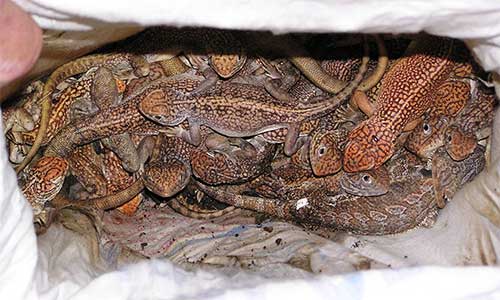Reporting wildlife crime
Wildlife crime encompasses a wide range of illegal activity from feeding wildlife up to and including poaching of wildlife for the illegal wildlife trade. The Wildlife Operations unit remains committed to protecting those that cannot speak for themselves.
In terms of scale, wildlife trafficking is one of the largest criminal issues faced globally, and the Northern Territory (NT) is not immune to this. Australian native reptiles and birds remain some of the most sought-after species across the world. Wildlife trafficking is done through incredibly complex criminal networks and the funding this brings the syndicates is used for other nefarious purposes. Reptiles are smuggled in extremely poor conditions, and many do not survive the process.
All native wildlife in the NT is protected and a permit is required for most in order to keep them in captivity. If a permit is not required, then proof of legally obtaining it will be required. Any Australian native animal that is not indigenous to the NT also requires a permit to keep in captivity. That includes deceased wildlife and parts of an individual such as skulls or skins.
To combat these issues, the department relies on the public to report anything they deem suspicious. As the age-old adage goes, “if you see something, say something”. Some common indicators of wildlife poaching to watch out for are vehicles stopped alongside the road in remote areas, people wearing headlamps in parks or possessing various forms of containers like Tupperware and snake hooks/tongs while going bushwalking. Usable reports include photos, a clear description of people involved, the make, model and number plate details of vehicles involved and a description of what happened.
In today’s world, anonymity and privacy are of paramount concern, which is why the process of reporting wildlife crime has been modernised. Previously, a report could be made by either calling and speaking with a ranger or sending an email to report something.
Now, there is an easy-to-use online form, and it can be completed on desktop or mobile device. The form allows an individual to report as themselves, or as a business/agency, or remain anonymous. Once completed, the form is sent automatically to investigators for follow up.
Thanks for helping to protect precious NT wildlife for generations to come.
Find out how to report, go to the Northern Territory Government website.

